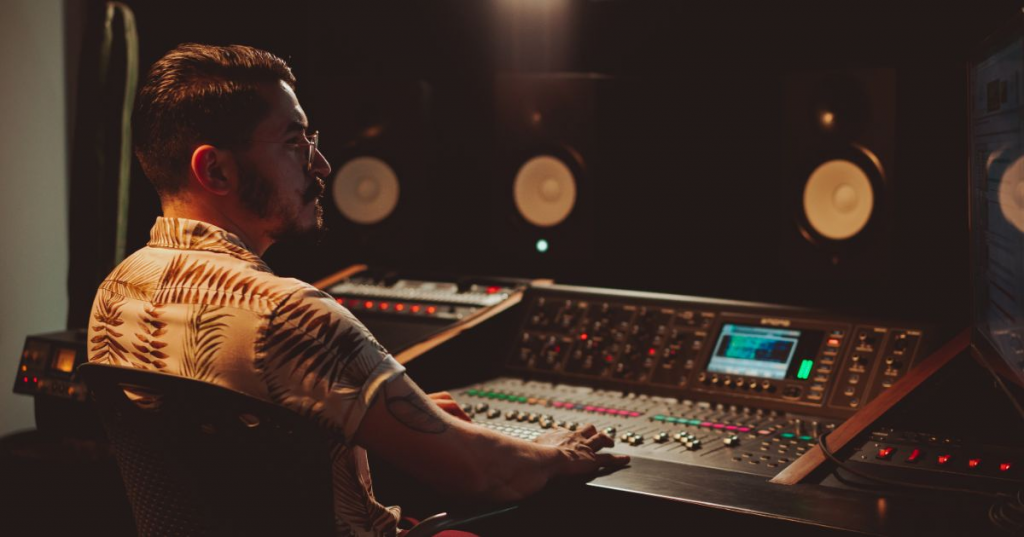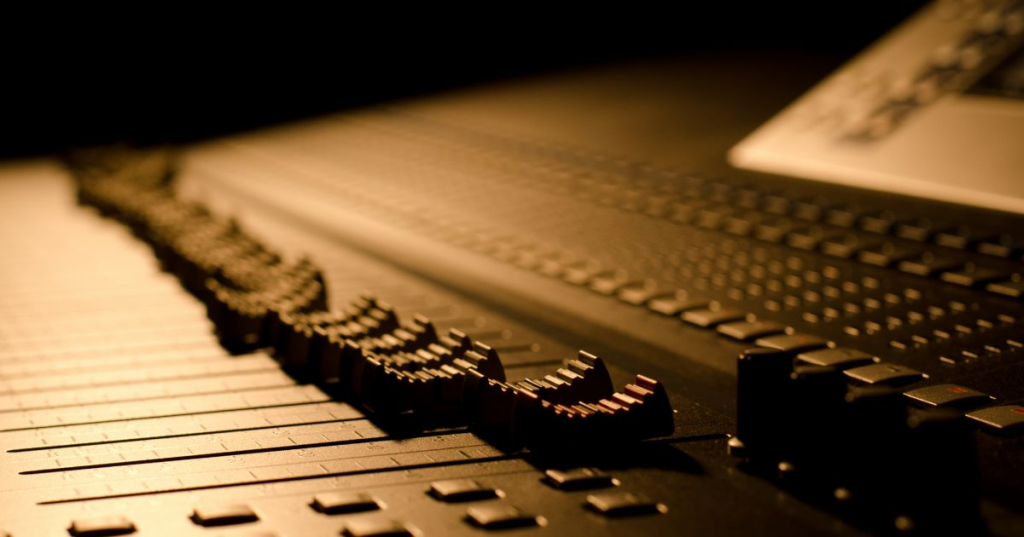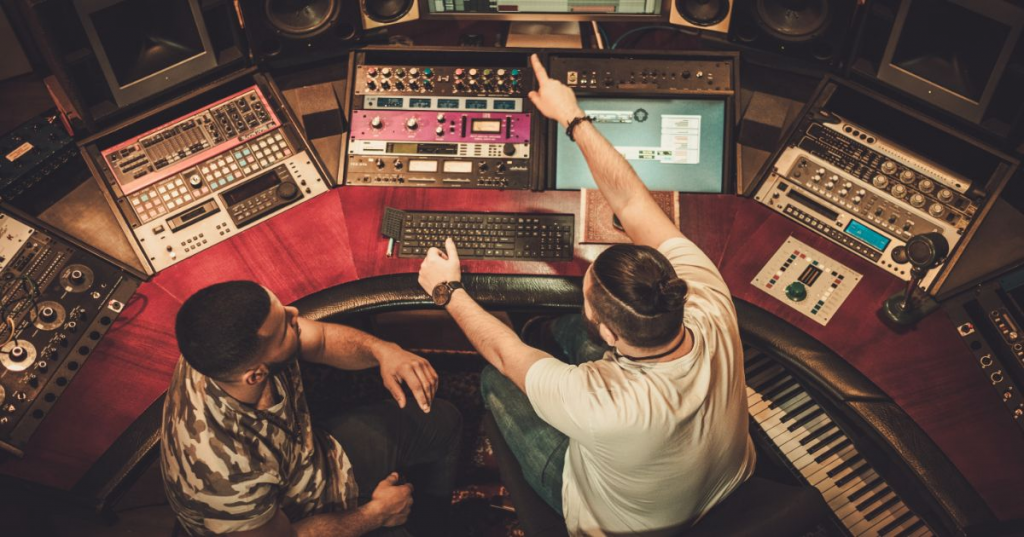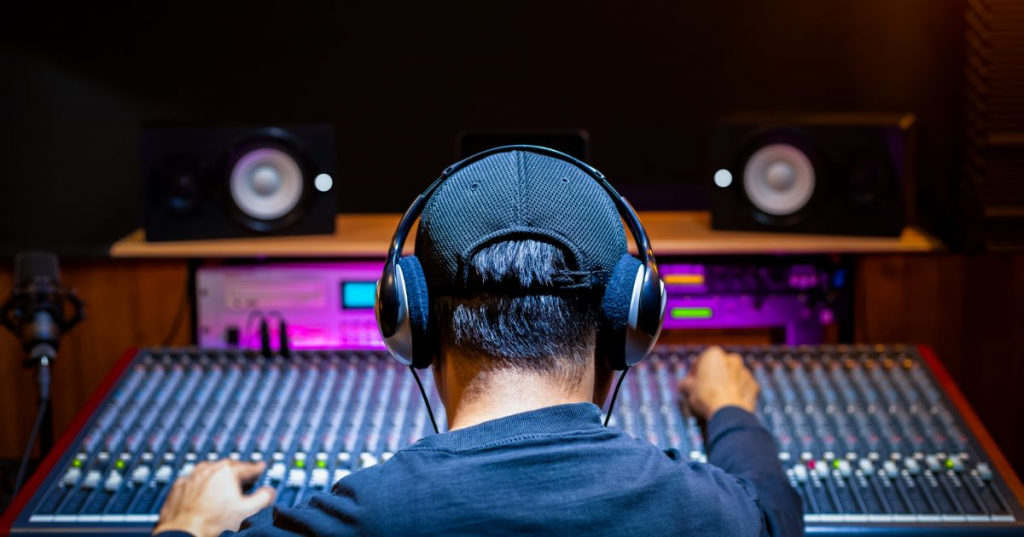Audio Engineer: Responsibilities, Career Paths & Salary
In the dynamic realm of audio production, the role of an audio engineer stands as a cornerstone, orchestrating the intricate harmony of sound that captivates our ears and souls. From recording studios to live events, their expertise reverberates across diverse landscapes, shaping the way we experience music, film, and entertainment.
This article will be your one-stop shop for all things audio engineering. We'll delve into the nitty-gritty of their daily tasks and unveil the path to becoming a successful audio engineer yourself. We'll even shed light on the age-old question: audio engineer vs. sound engineer – what's the difference? So, whether you're a budding musician, a film buff with a keen ear, or simply curious about the magic behind the music, keep reading and prepare to have your world of sound transformed!
What is the Audio Engineer?

An audio engineer is a professional who works with audio equipment and technology to record, mix, edit, and produce sound for various purposes, including music production, film, television, radio, video games, live events, and more.
According to the definition from the LanGeek Dictionary: “The audio engineer is a sound professional responsible for recording, mixing, and editing audio to achieve the desired results.”
Audio engineers use their technical expertise and creative skills to achieve the desired sound quality and artistic vision in their projects. They are the wizards behind the scenes, ensuring the music, vocals, sound effects, and dialogue we hear in recordings, films, television shows, and video games sound their best.
What do Audio Engineers do?

The responsibilities of an audio engineer can vary depending on their specialization and the context of their work. Some common tasks performed by audio engineers include:
Recording
Audio engineers capture sound using microphones and recording equipment in studio settings or on location. They may work with musicians, vocalists, voice actors, or other performers to record tracks for music albums, films, voiceovers, and more.
Studio Recording: In recording studios, audio engineers operate the recording equipment, including microphones, mixers, and digital audio workstations (DAWs). They position microphones to capture the optimal sound from instruments and vocals, ensuring a clean and balanced recording.
Live Sound Reinforcement: Live sound engineers manage the sound for live events like concerts, theatrical productions, and conferences. While recording might not be the primary focus, they may record the event for later use or live stream it.
Location Recording: Audio engineers can also be involved in location recording, capturing sound outside of a traditional studio setting. It could be for films, documentaries, capturing sound effects, or recording live performances in unique locations.
Post-Production Recording: Even in post-production, where audio engineers edit and mix sound for films, television, or video games, they might incorporate additional sound elements through recording. It includes recording voiceovers, sound effects, or ADR (automated dialogue replacement) to enhance the final production.
Overall, recording is a fundamental skill for audio engineers, and their expertise in capturing high-quality sound forms the foundation for many aspects of audio production.
Mixing
Imagine a recording studio with multiple tracks – each instrument, vocal, or sound effect captured separately. An audio engineer takes these individual tracks and blends them seamlessly using a mixing console or Digital Audio Workstation (DAW). Mixing includes several key techniques:
Balancing Levels: Adjust the volume of each track to create a well-balanced mix where all elements are audible and sit well together in the sonic spectrum.
Panning: Positioning sounds within the stereo field. An engineer can pan instruments or vocals to the left, right, or center to create a sense of space and width in the mix.
EQ (Equalization): Shaping the tonal characteristics of each track using EQ. It helps remove unwanted frequencies, boost clarity, and eliminate clashes between instruments.
Compression: Controlling the dynamic range of a sound. Compression can even out fluctuations in volume, making quiet sounds more audible and preventing loud transients from overpowering the mix.
Effects Processing: Adding effects like reverb, delay, chorus, or distortion can enhance the sound, create depth and space, and achieve a desired aesthetic effect.
Editing
Recordings aren't always flawless. While the term "perfection" might be subjective, editing plays a vital role in the audio engineer's toolbox. Here's how editing factors into the audio engineering workflow:
Trimming and Tightening: Recordings may contain unwanted sections like silence between takes, breaths, or minor mistakes. Audio engineers use editing tools to remove these imperfections.
Fixing Errors: Clicks, pops, or other background noises can mar a recording. Audio engineers can restore clarity and professionalism to the audio.
Comping Vocals or Instruments: Sometimes, the final product requires high perfection, so it needs record multiple takes of a vocal performance or instrument solo are recorded. The engineer can meticulously edit these takes together, selecting the best parts of each to create a flawless final performance.
Creating Seamless Transitions: Audio editing allows smooth transitions between different sections of a song or audio piece. Engineers can use fades, crossfades, or other techniques to create a natural flow and avoid jarring jumps between segments.
Sample Editing (Electronic Music/Hip-hop): In electronic music and hip-hop production, audio engineers heavily rely on editing to manipulate and sequence audio samples. They can chop, stretch, and layer these samples to create rhythmic beats and unique sonic textures.
While some editing strives for technical perfection, a skilled audio engineer understands that it's not just about removing flaws. Editing can also be used to:
Emphasize Certain Elements: An engineer might edit to bring out a specific instrument or vocal line during a particular section of the song for dramatic effect.
Create Space and Dynamics: Strategic use of editing can create pockets of silence or space within the mix.
Maintain Artistic Integrity: Ultimately, the editing choices should complement the overall artistic vision of the song or project. A good edit serves the music, not the other way around.
Post-Production
Imagine a film scene: Dialogue between actors, footsteps on the pavement, and the distant rumble of traffic. These sounds weren't necessarily all captured during filming. In post-production, the audio engineer takes various elements and blends them seamlessly:
Dialogue Editing and ADR: Recorded dialogue might have imperfections or background noise. The engineer meticulously edits out these issues and may even use ADR (Automated Dialogue Replacement) to re-record specific lines in a controlled studio environment.
Sound Effects Design: While some sound effects might be captured during filming, others are created and added in post-production. The engineer uses sound libraries and recordings to bring the world of the film or game to life.
Sound Design and Ambience: Creating a believable sonic atmosphere is key. The engineer crafts soundscapes using a combination of sound effects, ambiance recordings, and even synthesized elements to place the listener in the environment of the scene.
Foley: Foley artists, specialists who create sound effects in real-time, work closely with audio engineers in post-production. They create sounds like footsteps, clothing rustles, or object interactions to add a layer of realism and detail to the soundscape.
Mixing for Film, TV, and Games: Similar to music mixing, the audio engineer balances all the dialogue, sound effects, and ambiance into a cohesive whole. They ensure clarity, prioritize key elements depending on the scene, and create a believable and impactful soundscape that complements the visuals.
Post-production audio is a collaborative process. Audio engineers work with sound designers, dialogue editors, directors, and other creative professionals to achieve a shared vision. Their expertise is essential for crafting a compelling soundscape that:
Supports the Narrative: The sound design choices should complement the story being told. Scary movies rely on suspenseful sound effects, while comedies might use sound to create humor.
Enhances the Emotional Impact: Sound can be a powerful emotional tool. The audio engineer uses sound design techniques to elicit emotions in the audience, from fear and tension to joy and wonder.
Creates a Sense of Immersion: A well-crafted soundscape transports the listener to the world of the film or game. By using realistic sound effects and ambiance, the engineer helps suspend disbelief and draw the audience deeper into the story.
Live Sound
Unlike the controlled environment of a studio, live sound is all about capturing the energy and excitement of a performance in real-time. The audio engineer acts as a conductor, orchestrating the entire sound system to deliver an exceptional sonic experience for both the audience and the performers.
Step 1: Pre-Show Preparation
Live sound engineers meticulously set up the entire sound system, including microphones, mixers, speakers, and amplifiers, tailoring it to the specific venue and performance requirements.
Soundcheck is a crucial pre-show ritual where the engineer works closely with the performers to dial in their sound. Instruments and vocals are mixed up, and adjustments are made to balance the mix, ensure clarity, and address any potential feedback issues.
Step 2: Showtime!
During the performance, the live sound engineer becomes an extension of the band, constantly adjusting the mix in real time to account for changes in volume, instrument solos, and audience dynamics. Their focus is ensuring that every element is heard clearly and blended seamlessly for an enjoyable listening experience.
Technical gremlins are inevitable in live sound. A skilled engineer stays calm under pressure, troubleshooting any audio issues that may arise and making adjustments to maintain a smooth and uninterrupted performance.
The performers rely on "monitor mixes" fed back to them through speakers or headphones onstage. The live sound engineer creates customized mixes for each performer, allowing them to hear themselves and the other musicians clearly to ensure a tight and cohesive performance.
Beyond Technical Expertise
While technical know-how is essential, successful live sound engineers also possess other valuable qualities:
An Attentive Ear: The ability to discern subtle changes in sound quality and make adjustments accordingly is paramount.
Excellent Communication Skills: Clear communication with performers, stage crew, and venue staff is key to a successful live event.
Adaptability: The ability to think on their feet and adjust to unexpected situations is crucial in the dynamic world of live sound.
Live sound engineers are the silent heroes who ensure that the music we love comes alive at concerts, festivals, and other events. Their expertise and dedication guarantee that the aural experience matches the energy and excitement of a live performance.
How to Become an Audio Engineer?

Becoming an audio engineer involves a combination of education, hands-on experience, and networking. Here are the key steps to pursuing a career in audio engineering:
Step 1: Education
Here's a breakdown of the typical educational path:
High School Diploma
Start by completing your high school education with a focus on subjects like mathematics, physics, music, and computer science. These subjects provide a solid foundation for understanding audio engineering principles and technologies.
Bachelor's Degree in Audio Engineering or Related Field
While not always required, earning a bachelor's degree in audio engineering, music production, or a related field can provide comprehensive training and credentialing. Look for programs accredited by organizations like the Accrediting Commission of Career Schools and Colleges (ACCSC) or the National Association of Schools of Music (NASM).
Coursework
During your degree program, you'll take courses covering various aspects of audio engineering, including:
- Audio recording techniques
- Mixing and mastering
- Sound design
- Music Theory and composition
- Acoustics
- Digital audio workstations (DAWs) and software
- Live sound reinforcement
- Electronics and signal processing
Step 2: Hands-On Training
While formal education can be a great foundation, hands-on training is where the magic of becoming an audio engineer truly comes alive. Here are some ways to gain practical experience:
Way 1 - Invest in a Home Studio Setup
Having a home studio setup is an excellent way to gain valuable experience and hone your skills as an aspiring audio engineer.
Essential Gear: Start with the basics like a USB microphone, audio interface, headphones, and a computer with a Digital Audio Workstation (DAW) installed. Popular DAWs include Ableton Live, Logic Pro, and Pro Tools.
Practice Makes Progress: Experiment with recording yourself or friends playing instruments, singing, or creating sound effects. Use your DAW to edit your recordings, try different mixing techniques, and learn how to manipulate sound.
Online Resources: Supplement your learning with online tutorials and courses specifically focused on DAW software and home studio recording techniques.
Way 2 - Seek Internship or Volunteer Opportunities
Internships and volunteer opportunities help you gain valuable experience in audio engineering, build your network, and potentially land a paying job in the future.
Recording Studios: Contact local recording studios and inquire about internship or volunteer opportunities. Offer to help with tasks like setting up equipment, assisting during recording sessions, or performing basic editing duties.
Live Sound Companies: Live sound companies often need help with equipment setup, sound checks, or running monitors for performers. Interning or volunteering can provide valuable experience with live sound reinforcement.
Broadcast Studios: Broadcast stations might have opportunities to assist with audio editing, playback of pre-recorded material, or even shadowing the audio engineer during live broadcasts.
Way 3 - Assist Established Audio Engineers
Here are some effective strategies to land these experiences and make the most of them:
Freelance Opportunities: Look online or connect with musicians and producers in your area to see if any established audio engineers need assistance on freelance projects. Even shadowing them in a session can be a great learning experience.
Offer Help on Gigs: Some audio engineers might need a helping hand during live gigs, especially for smaller events. Offer your services to gain practical experience with live sound mixing and troubleshooting.
Way 4 - Participate in Workshops and Masterclasses
Workshops and masterclasses are fantastic avenues for focused learning and professional development in the ever-evolving world of audio engineering.
Industry Events: Attend workshops, masterclasses, and conferences focused on audio engineering. These events often feature renowned professionals who share their expertise and showcase real-world techniques.
Community Workshops: Local music schools, community centers, or even music stores might host workshops on specific aspects of audio engineering, like microphone techniques or live sound mixing.
Step 3: Building Skills
These key areas you need to focus on will equip you with the technical prowess, artistic sensibilities, and professional demeanor to thrive in audio engineering.
Technical Skills
Here are crucial technical skills you'll need to develop
Master DAW Software: Proficiency in industry-standard Digital Audio Workstations (DAWs) like Ableton Live, Logic Pro, or Pro Tools is fundamental. Learn how to navigate the interface, record audio, edit tracks, apply effects, and mix elements to create the final product.
Understanding of Audio Equipment: Familiarize yourself with the essential tools of the trade, including microphones (condenser, dynamic, etc.), mixers, signal processors, audio interfaces, and speakers/monitors.
Signal Processing and Mixing Techniques: Grasp the core principles of audio processing like equalization (EQ), compression, limiting, and reverb. Understand how these tools shape the sound, and develop your skills in applying them effectively during recording and mixing.
Creative Skills
While technical skills are crucial, don't underestimate the creative side. A sensitive audio engineer can use their knowledge and judgment to shape the sonic landscape and enhance the emotional impact of a song, film, or broadcast.
Soft Skills
In the world of audio engineering, where technical expertise reigns supreme, soft skills are often the secret weapon that propels you to success.
Communication: Strong communication skills are essential for collaborating with artists, producers, and other professionals. You'll need to clearly articulate technical concepts and effectively convey your creative vision.
Problem-Solving: Technical glitches and unexpected situations are inevitable. Develop your problem-solving skills to think critically, troubleshoot issues calmly, and find solutions that maintain audio quality.
Time Management: Audio engineering projects often involve deadlines. Learn to manage your time effectively to complete tasks efficiently while maintaining high-quality standards.
Step 4: Network and Build Industry Connections
The world of audio engineering thrives on connections. Building a strong network can open doors to exciting opportunities, mentorships, and even your first professional gigs. Here are some ways to network and build industry connections as an aspiring audio engineer:
Attend Industry Events
Attend conferences, workshops, trade shows, and networking events specifically tailored to audio engineering. These events provide opportunities to meet industry professionals, exchange ideas, and stay updated on the latest trends and technologies.
Join Professional Organizations
Become a member of professional associations such as the Audio Engineering Society (AES), the Society of Professional Audio Recording Services (SPARS), or the Recording Academy (Grammy Awards). These organizations offer networking events, forums, and resources for audio engineers.
Participate in Online Communities
Join online forums, social media groups, and discussion boards dedicated to audio engineering. Engage with fellow audio enthusiasts, share knowledge, ask questions, and seek advice from experienced professionals.
Collaborate on Projects
Collaborate with musicians, filmmakers, content creators, and fellow audio engineers on projects to expand your network and gain valuable experience. Offer your services for recording, mixing, mastering, or sound design projects, and leverage these collaborations to build relationships and showcase your skills.
Seek Mentorship
Identify experienced audio engineers or industry professionals who can serve as mentors and provide guidance and advice as you navigate your career. Reach out to them through professional channels, express your interest in learning from them, and be open to their insights and feedback.
Remember that networking is a long-term investment in your professional growth, so be proactive, authentic, and persistent in your efforts to build a strong network of industry connections.
Step 5: Specialization
Specializing in a particular area of audio engineering can enhance your expertise, career prospects, and opportunities for advancement in the field. Here are some common specializations within audio engineering:
Music Production
Specializing in music production involves working closely with musicians, bands, and artists to record, mix, and produce music tracks. Music producers are responsible for guiding the creative process, arranging songs, and overseeing the recording and mixing sessions to achieve the desired sound.
Sound Design
Sound designers focus on creating and manipulating audio elements for various media, including film, television, video games, and interactive media. They use sound effects, Foley, dialogue, and music to enhance storytelling, create immersive environments, and evoke emotions in audiences.
Live Sound Reinforcement
Specializing in live sound reinforcement involves managing audio systems for live events, concerts, theater productions, and corporate functions. Live sound engineers set up and operate sound equipment, mix live performances, and ensure clear, balanced sound for audiences in real time.
Broadcast Engineering
Broadcast engineers focus on designing, installing, and maintaining audio systems for radio and television broadcasting facilities. They ensure the smooth operation of audio equipment, troubleshoot technical issues and implement broadcast standards and regulations.
Remember that the journey of becoming a successful audio engineer takes dedication, passion, and a willingness to learn. Embrace the challenges, hone your skills, and actively seek opportunities to gain experience – and above all, keep your passion for music burning bright!
Audio Engineering Salary

Based on the provided data from Indeed, the average salary for an audio engineer in the United States is $29.71 per hour. The lowest reported salary for audio engineers is $13 per hour. Some entry-level or less experienced audio engineers may start at this lower wage, possibly in positions with limited responsibilities or in regions with lower cost of living.
Meanwhile, the highest reported salary for audio engineers is $67.92 per hour. It likely reflects experienced professionals with specialized skills and advanced qualifications or working in high-demand sectors such as film, television, or music production.
Factors Affecting Salary Range:
Experience: Audio engineers with more experience and expertise typically command higher salaries than those who are just starting.
Location: Salaries can vary significantly depending on geographic location, with higher wages typically found in major metropolitan areas or regions with a strong entertainment industry presence.
Industry Sector: The sector in which an audio engineer works can also impact salary, with positions in fields such as film, television, music production, or live events often offering higher pay than other sectors.
Specialization: Specialized skills or expertise in areas such as sound design, live sound reinforcement, or post-production may command higher salaries due to the demand for these specialized services.
Job Market Trends: It's essential to consider current job market trends and demand for audio engineers when analyzing salary data. Factors such as industry growth, technological advancements, and shifts in consumer preferences can influence salary trends over time.
The Difference Between Sound Engineers and Audio Engineers

"Audio engineer" and "sound engineer" are often used interchangeably, but they can have slightly different connotations depending on context. Generally, both terms refer to professionals who work with sound, recording, and audio equipment, but there can be nuances in their specific roles and responsibilities.
"Audio engineer" is a broader term that encompasses various aspects of working with sound, including recording, mixing, editing, and producing audio for a wide range of applications such as music production, film, television, radio, live events, and more. Audio engineers may specialize in specific areas such as studio recording, live sound reinforcement, post-production for film and TV, or mastering.
"Sound engineer," on the other hand, is often used more narrowly to refer to professionals who primarily work with live sound reinforcement and audio systems for events, concerts, theaters, conferences, and other live performances. Sound engineers focus on setting up and operating sound equipment, mixing live audio, and ensuring optimal sound quality and clarity for the audience.
In essence, both terms generally refer to professionals who work with sound and audio equipment. "Audio engineer" tends to be a broader term. While "sound engineer" may specifically emphasize the live sound aspect of the profession. However, specific usage and interpretation of these terms can vary depending on the context and industry practices.
Skilltrans introduces some related courses to help you excel in your audio engineering career. Please click on the course name below to learn more:
Audio Recording 101: Record Voice Audio for Video Production
In this course, you will learn the essentials of Recording Voice Audio. You will learn the tools and processes to record and process audio so you can get great-sounding audio.
The instructor provides you with numerous tips and tricks, helping to improve your knowledge and ears for recording audio.
This course has been designed in a way that is suitable for beginners, but the instructor still recommends taking this course if you have some experience in audio recording.
Conclusion
The world of audio engineering offers a captivating blend of technical expertise and creative expression. It's a career path paved with challenges, long nights, and the constant pursuit of sonic perfection. But for those with a passion for sound and a dedication to honing their craft, the rewards are immense.
The audio engineer's role extends far beyond simply turning knobs. They are the architects of sonic landscapes, shaping the emotional impact of music, film, and countless other auditory experiences. With the knowledge you've gained from this article, you're now equipped to appreciate the artistry behind every song you listen to, every movie you watch, and every podcast that captures your attention.
So, are you ready to embark on your audio-engineering adventure? Remember, the journey begins with a single step. Start by exploring the resources and opportunities outlined throughout this article. With dedication, perseverance, and a love for sound, you can become a master of the audio realm. The world awaits your sonic signature!
Becoming an audio engineer requires not only technical skills but also a variety of skills. Sign up for Skilltrans courses today to improve your skills. We are always ready to become a companion in your career.

Meet Hoang Duyen, an experienced SEO Specialist with a proven track record in driving organic growth and boosting online visibility. She has honed her skills in keyword research, on-page optimization, and technical SEO. Her expertise lies in crafting data-driven strategies that not only improve search engine rankings but also deliver tangible results for businesses.



